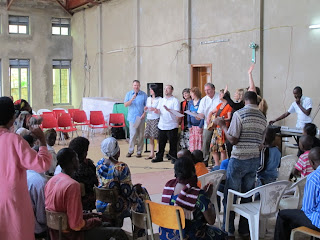by Jason Benedict
RCE Strategist
I began the day in a government office trying to come into agreement with a government official on the details of our upcoming graduation. After some debate we got it ironed out, and I believe we are on track now. It is amazing to me that we will be graduating the second batch of entrepreneurs at the beginning of May.
Speaking of graduates, I was encouraged by a conversation with one of our graduates last night. He has been working steadily to launch his business, a web portal/information service. There is very little in this regard specifically for Rwanda. He told me, “The site is up, can I meet with you and discuss my monetization strategy.” I know a little about this subject, but what he really needs in a mentor with some specific expertise in this area. It is our task to help connect him with such a mentor: someone who can answer a few emails – schedule a few skype calls, or even come here for a week, roll up their sleeves and help this entrepreneur make it. I hope that person is reading this blog. Another thing that most of our entrepreneurs have requested - even those who are not Christians – is a prayer partner.
Stay tuned for something a little different... on “Theological Pathologies Regarding Business”
It begins this way:
Today, I heard yet another story of a business person who came to the Lord in a dramatic way and has begun to think that they "need to leave business and go into ministry." When I hear it put that way it really disturbs me...
RCE Strategist
I began the day in a government office trying to come into agreement with a government official on the details of our upcoming graduation. After some debate we got it ironed out, and I believe we are on track now. It is amazing to me that we will be graduating the second batch of entrepreneurs at the beginning of May.
Speaking of graduates, I was encouraged by a conversation with one of our graduates last night. He has been working steadily to launch his business, a web portal/information service. There is very little in this regard specifically for Rwanda. He told me, “The site is up, can I meet with you and discuss my monetization strategy.” I know a little about this subject, but what he really needs in a mentor with some specific expertise in this area. It is our task to help connect him with such a mentor: someone who can answer a few emails – schedule a few skype calls, or even come here for a week, roll up their sleeves and help this entrepreneur make it. I hope that person is reading this blog. Another thing that most of our entrepreneurs have requested - even those who are not Christians – is a prayer partner.
Stay tuned for something a little different... on “Theological Pathologies Regarding Business”
It begins this way:
Today, I heard yet another story of a business person who came to the Lord in a dramatic way and has begun to think that they "need to leave business and go into ministry." When I hear it put that way it really disturbs me...






















